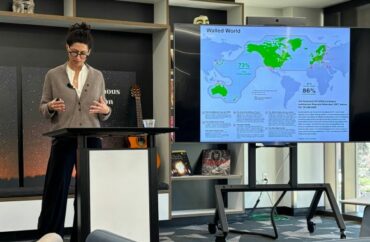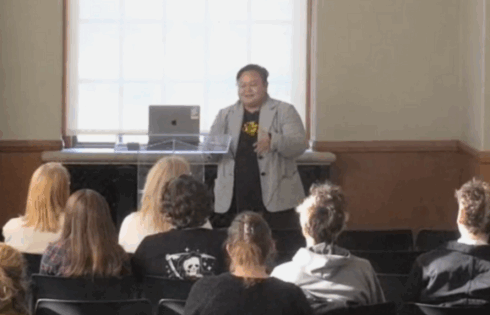
Trump’s ‘border hysteria’ built on ‘white nationalism,’ professor says
PHOENIX – The border should be “defamiliarized,” as it is “ethically indefensible,” Georgetown Law Professor Sherally Munshi said at an Arizona State University event Wednesday.
In her talk, titled “Unsettling the Border,” Munshi said critics of today’s border policies are often brushed off with a knee-jerk question: “What, do you want open borders?” To her, this isn’t a serious attempt to engage; it’s a shutdown tactic that dodges honest discussion.
Worse, she said, this is a flawed question because it skips over deeper issues about who gets to cross borders and why. Instead of digging into questions about what’s morally or practically right—the debate assumes borders are a given, unquestioned backdrop, she said.
The professor said she aims to disrupt the way people see the border as a normal part of life, as “there is nothing natural or inevitable about the United States’ contemporary borders.”
“Our task, as I put it, is to unsettle the border, to defamiliarize, disenchant, and recontextualize it by critically evaluating the historical processes, the legal developments, the discursive formations that naturalize and legitimate the border,” she said.
Her lecture also aimed to reframe “the so-called border crisis, first by identifying it as a crisis of imagination,” or failure of political creativity, she said.
“Rather than redress the fact that the international border regime is practically unsustainable [and] ethically indefensible, majorities in the whitest and wealthiest nations are embracing an increasingly authoritarian form of nationalism and exclusion,” she said. According to the professor, this trend reflects a refusal to rethink a failing system.
Central to her argument is how borders shape perceptions of group identity, defining “us” versus “them.”
“Colonial borders never merely represent existing differences, instead, they produce the differences that they govern,” Munshi said.
“In other words, within the American imaginary, the southern border divides white from indigenous, purity from heterogeneity, civilization from savagery, settler from Indian,” she said.
She traced what she called an ”exclusionary regime” in the U.S. back to the Immigration and Nationality Act of 1965.
However, President Donald Trump made matters worse, as he “almost single-handedly recast the immigration debate in terms of white nationalism,” she said.
“[T]he viciously anti-immigrant policies implemented during his first term, the Muslim ban, the separation of families, detention of children– all of these were met with liberal protest and outrage.” However, “that outrage has failed to give rise either to a sustained critique of white nationalism or any meaningful alternative to our exclusionary border regime,” she said.
Instead, Trump continues to stoke “border hysteria,” which she called “an enormous engine for generating resentment,” gaining political leverage, and “expanding state power.”
Conservatives are now pulling the mainstream toward their side on this issue because liberals haven’t managed to “stake an alternative position,” the professor said.
This shift was evident in the election outcomes, Democrat support of the “misguided” Laken Riley Act, coupled with “a lack of protest as the state plans a purge of immigrants,” she said.
Munshi then listed the immigration policies Trump has so far enacted, adding that the “unprecedented callousness of these orders is intended to further disorient the left.”
She encouraged lawyers and advocacy groups to challenge these orders, but her broader call was to “resist the Trump administration’s attempt to accelerate time, collapse our political horizon, and instead, resituate ourselves again in this debate with a longer unfolding history.”
The professor didn’t just take aim at Trump, however. She also criticized the immigration policies of former presidents Joe Biden and Barack Obama, as they were “not radically different” from Trump’s.
“Biden promised to build, quote, ‘not another foot of wall,’ but he did here in Arizona in 2023. He continued Trump and Obama-era policies of border externalization, pressuring other countries to militarize their borders or enforce the United States’ exclusionary agenda,” she said.
Professor Munshi and Event Coordinator Dustin Davila-Bojorquez have not responded to requests for comment via email clarifying terms in the lecture.
The event was hosted by ASU’s “School of Transborder Studies,” which states on its website that it aims to make “borders human.”
The school promotes “social change by developing cutting-edge interdisciplinary coursework and research on the populations of the U.S.-Mexico transborder space and beyond,” the website states.
Further, it provides a link to resources for “undocumented students.”
MORE: Arizona State U. scholars condemn ‘white ownership’ of Shakespeare
IMAGE: Gabrielle Temaat
Like The College Fix on Facebook / Follow us on Twitter






Please join the conversation about our stories on Facebook, Twitter, Instagram, Reddit, MeWe, Rumble, Gab, Minds and Gettr.